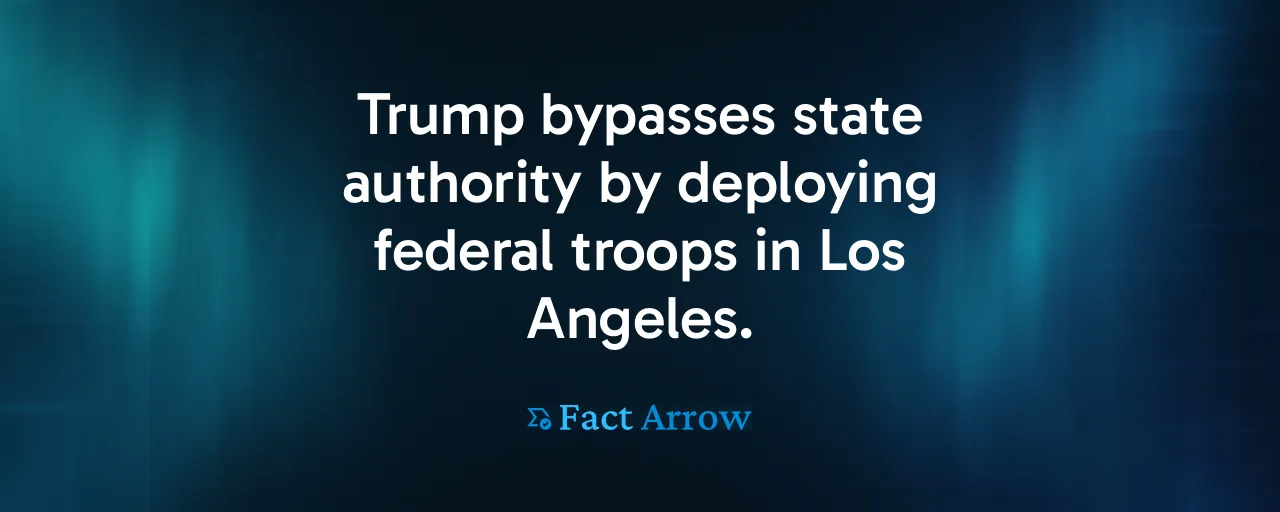A Bold Attack on State Power
President Trump's choice to flood Los Angeles with 4,800 National Guard troops and Marines caught many off guard. Governor Gavin Newsom labeled it a threat to states' rights, and he's right. This deployment asserts presidential dominance over states, a dangerous precedent that demands our attention. It is not about protecting citizens.
By the time federal troops arrived, LA's protests had quieted. Local police reported just 44 arrests and limited property damage, hardly a crisis. Yet Trump, claiming a 'rebellion,' seized control of California's National Guard without Governor Newsom's approval. This bypasses the legal process and signals a troubling willingness to override state authority.
This issue extends far beyond California's borders. Trump's June 7, 2025, memorandum grants him power to federalize any state's National Guard. If he can do this in Los Angeles, no state is safe from similar overreach. The delicate balance of federalism, which ensures states retain control over their own resources, is under direct threat.
Violating the Law With Impunity
Federal law, specifically 10 U.S.C. §12406, requires a governor's consent to federalize a state's National Guard. Trump ignored this, deploying troops without consulting Newsom, who quickly confirmed his opposition. This blatant disregard for legal protocol undermines California's sovereignty and invites future executive abuses.
Trump's justification, a supposed 'rebellion' in LA, lacks credibility. Federalization is reserved for extreme cases like foreign invasions or widespread insurrections, none of which apply here. Local law enforcement had already restored order. Trump himself admitted in 2020 that he couldn't federalize the Guard in Portland without a governor's request, revealing his own inconsistency.
The deployment's wastefulness compounds the problem. The administration spent $134 million on travel, lodging, and training for troops who serve no clear purpose in LA. This diverts resources from California's critical needs, like wildfire response and drug interdiction, prioritizing political posturing over practical governance.
Escalating Tensions, Endangering Rights
Far from stabilizing LA, federal troops have reignited protests. Crowds grew larger in response to the military presence, a predictable outcome given historical lessons. The 1970 Kent State tragedy showed how quickly militarized responses can spiral. Deploying troops for political gain risks repeating those mistakes, with real consequences for communities.
Some argue the deployment was necessary, citing property damage in Compton and Paramount as proof of local failure. They frame it as protecting federal interests, like immigration enforcement. But local police were managing, and Title 10 restrictions prevent Guard members from making arrests or controlling crowds. The troops are a provocative symbol, offering no practical solution.
For communities wary of systemic overreach, this feels deeply threatening. Advocates for civil liberties have long cautioned that militarizing issues like immigration or protests disproportionately targets marginalized groups. When troops are deployed to 'protect ICE personnel,' it intimidates those exercising their right to free speech. How can democracy thrive under such pressure?
Standing Up for Our Democracy
Governor Newsom's June 2025 lawsuit is a critical response to this overreach. It challenges Trump's actions as violations of the Administrative Procedure Act and the Tenth Amendment, arguing that no genuine rebellion justifies the deployment. Legal experts suggest the courts may limit such unilateral moves, setting a vital check on executive power.
Lawsuits alone aren't enough. Congress has a clear responsibility to reform vague statutes like the Insurrection Act and §12406, setting strict criteria for federalization and requiring transparent reporting. Advocates for democratic protections are pushing these changes to ensure the military remains under civilian control, preventing its use as a tool for suppressing dissent.
This fight matters to every American. Allowing Trump to seize state militias unchecked opens the door to further abuses, perhaps targeting dissenting governors or stifling protests nationwide. Immediate action is necessary, demanding accountability to preserve the democratic principles that define us. What will it take to protect our freedoms?
